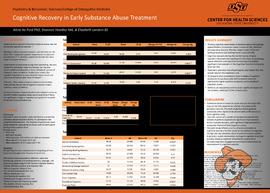| dc.contributor.author | Ford, Alicia Ito | |
| dc.contributor.author | Headley, Shannon | |
| dc.contributor.author | Landers, Elizabeth | |
| dc.date.accessioned | 2020-05-05T19:37:40Z | |
| dc.date.available | 2020-05-05T19:37:40Z | |
| dc.date.issued | 2020-02-28 | |
| dc.identifier | ouhd_ford_cognitiverecoveryin_2020 | |
| dc.identifier.citation | Ford, A. I., Headley, S., & Landers, E. (2020, Feb. 28). Cognitive recovery in early substance abuse treatment. Poster presented at Research Day at Oklahoma State University Center for Health Sciences, Tulsa, OK. | |
| dc.identifier.uri | https://hdl.handle.net/11244/324193 | |
| dc.description.abstract | Background: Substance abuse is known to cause injury to the brain that may not be fully repaired by sobriety. The most commonly identified impairments are in attention, working memory, and executive functioning. Although research has found that most people do experience some level of cognitive improvement after stopping substance use, it is unclear how quickly this happens and if there is a particular pattern in improvement. This pilot study tested the natural rate of cognitive recovery in early substance abuse treatment. | |
| dc.description.abstract | Methods: Participants were 28 adults newly admitted to a residential substance abuse treatment facility. All were post- detox. The majority were in treatment for polysubstance abuse, with 15 having primary opioid abuse. NIH Toolbox cognition battery was administered at intake and 4 weeks later. | |
| dc.description.abstract | Results: Regarding cognition, primary weaknesses at baseline were in processing speed (Pattern Comparison mean t- score=41.96), attention and executive function (Flanker mean t- score=43.0) and working memory (List Sorting mean t- score=44.04). Cognitive recovery during the normal course of early inpatient treatment was significant in the areas of processing speed, attention and executive functioning and yielded significant improvement in the Cognitive Function Composite Score (p<.01). | |
| dc.description.abstract | Conclusions: Consistent with previous research, this pilot study found that patients commonly enter inpatient treatment with inefficiencies in fluid cognition skills. Over the course of 1-month of inpatient treatment, this sample of patients experienced significant improvement across multiple domains, with significant improvements in composite Fluid and Total Cognition scores. Further study on the pattern of cognitive changes during substance abuse treatment may be used to help better match intervention strategy to cognitive level and possibly develop cognitive rehabilitation protocols to increase treatment engagement and extend abstinence via improvement in cognitive capacity. | |
| dc.format | application/pdf | |
| dc.language | en_US | |
| dc.publisher | Oklahoma State University Center for Health Services | |
| dc.rights | The author(s) retain the copyright of have the right to deposit the item giving the Oklahoma State University Library a limited, non-exclusive right to share this material in its institutional repository. Contact Digital Resources and Discovery Services at lib-dis@okstate.edu or 405-744-9161 for the permission policy on the use, reproduction or distribution of this material. | |
| dc.title | Cognitive recovery in early substance abuse treatment | |
| osu.filename | ouhd_ford_cognitiverecoveryin_2020.pdf | |
| dc.type.genre | Presentation | |
| dc.type.material | Text | |
